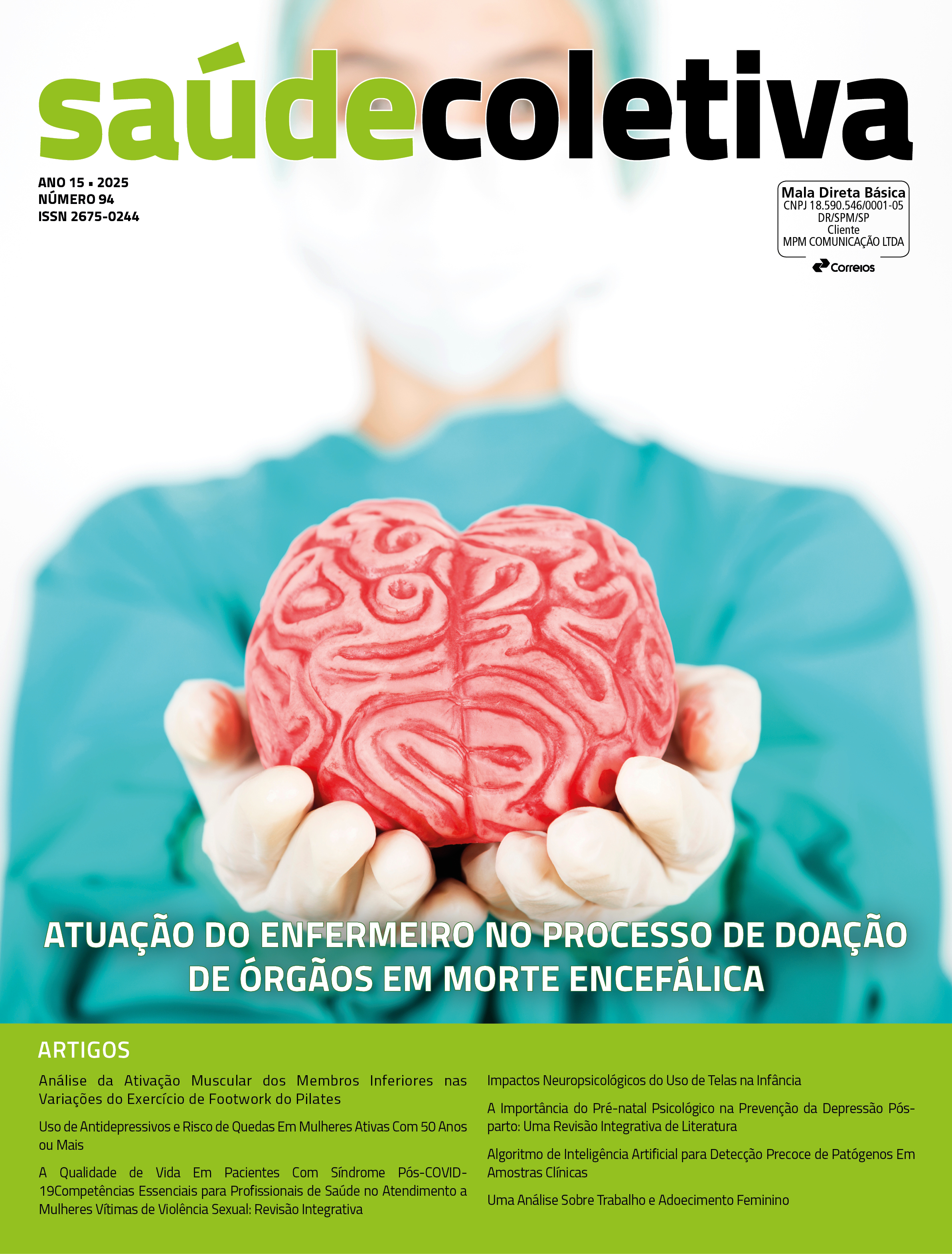The Impact of Socioeconomic Conditions on the Oral Health of Socially Vulnerable Children and Adolescents
DOI:
https://doi.org/10.36489/saudecoletiva.2025v15i94p15367-15380Keywords:
Oral Health, Public Health, Socioeconomic Conditions, Dental Caries, Social Vulnerability, Education LevelAbstract
Objective: To analyze the impact of socioeconomic conditions on the oral health of vulnerable children and adolescents, considering household head education, income, and ethnic and gender disparities. Methods: Cross-sectional study with 267 children and adolescents (mean age: 6.7 years) from non-profit schools in the Federal District of Brazil. Sociodemographic and clinical data (dmft, DMFT) were collected and statistically analyzed to assess associations with oral health conditions. Results: Education and per capita income were significantly correlated with dental caries, with higher prevalence in families with lower education levels (primary dentition: 52.5%, permanent dentition: 60.5%). Brown-skinned children had a higher prevalence of caries (58.9%) than white children (29.1%). The DMFT index was higher among girls. A positive correlation was observed between age and caries in permanent teeth. Conclusion: Socioeconomic factors influence children's oral health, exacerbating racial and gender inequalities. The findings highlight the need for public policies to expand access to oral healthcare and preventive strategies for vulnerable populations.
References
World Health Organization. Fact Sheets: Oral health: World Health Organization; [updated 14 March 2023. Available from: https://www.who.int/news-room/fact-sheets/detail/oral-health.
Bernabe E, Marcenes W, Hernandez CR, Bailey J, Abreu LG, Alipour V, et al. Global, Regional, and National Levels and Trends in Burden of Oral Conditions from 1990 to 2017: A Systematic Analysis for the Global Burden of Disease 2017 Study. J Dent Res. 2020;99(4):362-73. DOI: https://doi.org/10.1177/0022034520908533
Manohar N, Hayen A, Fahey P, Arora A. Obesity and dental caries in early childhood: A systematic review and meta-analyses. Obes Rev. 2020;21(3):e12960. DOI: https://doi.org/10.1111/obr.12960
Organization WH. Bangkok Declaration – No Health Without Oral Health 2025 [Available from: https://www.who.int/publications/m/item/bangkok-declaration---no-health-without-oral-health.
Petersen PE, Kwan S. Equity, social determinants and public health programmes--the case of oral health. Community Dent Oral Epidemiol. 2011;39(6):481-7. DOI: https://doi.org/10.1111/j.1600-0528.2011.00623.x
Mathur VP, Dhillon JK. Dental Caries: A Disease Which Needs Attention. Indian J Pediatr. 2018;85(3):202-6. DOI: https://doi.org/10.1007/s12098-017-2381-6
Chaffee BW, Rodrigues PH, Kramer PF, Vítolo MR, Feldens CA. Oral health-related quality-of-life scores differ by socioeconomic status and caries experience. Community Dent Oral Epidemiol. 2017;45(3):216-24. DOI: https://doi.org/10.1111/cdoe.12279
Maciel IP, Basso MB, Piovesan É TA, Ribeiro C, Queiroz IQD, Alves JB, et al. Is there an association between family structure and the oral health of socially vulnerable children? Braz Oral Res. 2023;37:e133. DOI: https://doi.org/10.1590/1807-3107bor-2023.vol37.0133
Peres MA, Macpherson LMD, Weyant RJ, Daly B, Venturelli R, Mathur MR, et al. Oral diseases: a global public health challenge. Lancet. 2019;394(10194):249-60. DOI: https://doi.org/10.1016/S0140-6736(19)31146-8
Traverso-Yépez MA. Dilemas na promoção da saúde no Brasil: reflexões em torno da política nacional. Interface-Comunicação, Saúde, Educação. 2007;11(22):223-38. DOI: https://doi.org/10.1590/S1414-32832007000200004
WHO. The Ottawa Charter for Health Promotion. World Health Organization; 1986.
Oliveira Cruz B, Jahns Schlabitz C, Vladimir Queiroz I. Aspectos Econômicos do Distrito Federal. Brasília-DF: Companhia de Planejamento do Distrito Federal - Codeplan; 2018. Available from: https://www.codeplan.df.gov.br/wp-content/uploads/2018/02/TD_37-Aspectos-Econ%C3%B4micos-do-Distrito-Federal.pdf.
Brasil. MdS. SB BRASIL 2023 Pesquisa Nacional de Saúde Bucal RELATÓRIO FINAL. In: Saúde. SdAPà, Comunitária DdEgePtdSd, editors. 2024. p. 538.
Poutanen R, Lahti S, Tolvanen M, Hausen H. Gender differences in child-related and parent-related determinants of oral health-related lifestyle among 11- to 12-year-old Finnish schoolchildren. Acta odontologica Scandinavica. 2007;65:194-200. DOI: https://doi.org/10.1080/00016350701308356
de Abreu MA-O, Cruz AJS, Borges-Oliveira AC, Martins RC, Mattos FF. Perspectives on Social and Environmental Determinants of Oral Health. LID - 10.3390/ijerph182413429 [doi] LID - 13429. (1660-4601 (Electronic)). DOI: https://doi.org/10.3390/ijerph182413429
Shi C, Faris P, McNeil DA, Patterson S, Potestio ML, Thawer S, et al. Ethnic disparities in children’s oral health: findings from a population-based survey of grade 1 and 2 schoolchildren in Alberta, Canada. BMC Oral Health. 2018;18(1):1. DOI: https://doi.org/10.1186/s12903-017-0444-8
Choi SE, White J, Mertz E, Normand S-L. Analysis of Race and Ethnicity, Socioeconomic Factors, and Tooth Decay Among US Children. JAMA Network Open. 2023;6(6):e2318425-e. DOI: https://doi.org/10.1001/jamanetworkopen.2023.18425
Petersen PE, Baez RJ, World Health O. Oral health surveys: basic methods. 5th ed. Geneva: World Health Organization; 2013 2013.
Bagramian R, Garcia-Godoy F, Volpe A. The global increase in dental caries. A pending public health crisis. American journal of dentistry. 2009;22:3-8.
Petersen PE. World Health Organization global policy for improvement of oral health--World Health Assembly 2007. (0020-6539 (Print)).







